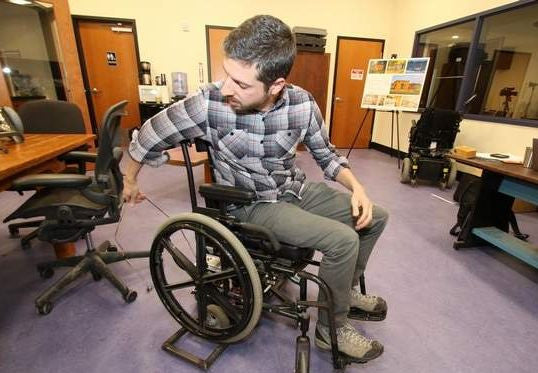Center for Discovery team gets $1M from Google for wheelchair design invention

HURLEYVILLE — A team of health care professionals and designers at The Center for Discovery want to turn the wheelchair industry on its head — and Google donated a lot of money to help make that happen.
Many of the children and adults who live or get treatment at the Center are not independent enough to drive power wheelchairs regularly, but Damiao wanted a power chair option to be available to anyone.
Increased mobility allows people with disabilities to more fully participate in life, he said.
Damaio teamed up with occupational therapist assistant Jason Kean and Mark McNamara, director of the Center's Hurleyville Makers Lab.
Together with other health care professionals and engineers at the Center and in the Makers Lab, they designed the indieGo, a platform that a person in a manual wheelchair can roll onto, and then control as an adapted power chair.
The indieGo will be cheaper, more manageable and more accessible than traditional power wheelchairs.
After building several prototypes, the indieGo team applied for a Google Impact Challenge: Disabilities grant, and was awarded $1.125 million to help streamline the design and begin to produce and market the device.
There are a lot of problems with the current medical device industry, Damiao said.
Equipment like power chairs are too expensive, bulky and difficult to get covered by insurance, and the technology is proprietary.
“The goal is to build something that turns the present industry on its head,” Damiao said.
The indieGo will be small and light enough that it can be carried up a flight of stairs and fit in the trunk of a car.
It won’t look like a medical device, and the controls for the platform will be designed as an open interface that can be adapted to different disabilities - from a handheld joystick to buttons a person can touch with their head.
For people who cannot walk, having a chair they can move on their own is therapeutic and rehabilitative, Damiao said.
Making sure the indieGo does not look like a typical medical device is important, McNamara said.
He noted that recreational hover boards are sleek, sexy and modern, but no one attempts to design mobility devices in a similar manner.
“It’s a massive gap, and we hope to fill it,” McNamara said.
Their target price for an indieGo is $1,000, compared to the $7,000 cost of an average power chair, and it will be available to order online.
It will not be priced for profit, McNamara said. Any profits will go toward improving the design or developing more projects.
Under the terms of the Google grant, the team will begin a user study within a year, and the indieGo will be on the market in two years.
All plans for the indieGo will be open source, so anyone will be able to access them online and build their own indieGo.
